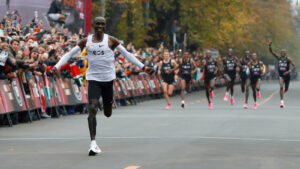When I first saw the headline about a runner becoming the first human being in history to run a marathon in fewer than two hours, I was delighted, thrilled, amazed.
Oh, but then I saw some of the details of it.
Eliud Kipchoge of Kenya didn’t do it in a race. He didn’t run 26.2 miles against other runners. Oh, no. It was a controlled setting, complete with what I understand were “pacemakers,” who ran with him to keep him running on the record-setting pace.
Kipchoge compared his feat with Roger Bannister running the first sub-four-minute mile in 1954. Ha! There can be no comparison. Bannister did it in competition. He ran the mile in record fashion, then all but collapsed in the arms of the people waiting for him at the finish line; these days, runners finish such a race in well less than four minutes and look as though they’re ready to go another mile.
Kipchoge’s “record” won’t be entered into the books. It wasn’t sanctioned by the sport’s governing body for reasons I have sought to explain.
Hey, I don’t mean to disparage what this guy did. I cannot even think about running for more than 26 miles, let alone doing so in the fashion that Eliud Kipchoge accomplished the feat.
It’s just that it was a set-up in a fashion intended to produce a record-setting run.
It kind of reminds me of the time Billie Jean King defeated Bobby Riggs in that 1973 “tennis match,” which at the time was hailed as the first time a woman defeated a man on a tennis court. Good grief!
King was at the top of her game. Riggs was a washed up old man. It wasn’t a fair fight.
So it is with this “record” run. If someone does it while competing against other runners, then I’ll get excited.
